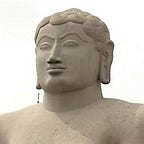The Festival of Kama
(This is the English translation of one of my posts in Kannada, that was written several years ago. You may be surprised I did not title it “The Festival of Kama Dahana” (The burning of Kama) , althouth that is what the festival commemorates. The reason is that in Kannada, it is simply known as “Kamana Habba, the festival of Kama)
Today is the full moon day of the month of Phalguna. This is the day which is celebrated as the “Festival of Burning of Kama”, the festival of “Kama Dahana”. We belive it was on this day Shiva burned the God-of-Love, Kama, or Manmatha, by the fire of his third eye. It was after opening of his eyes did Shiva see Parvati who was attending him for months, fell in love, and then married her. The ascetic Shiva thus became a householder and a lover beyond compare. The wedding of Shiva and Parvati, and the birth of Shanmukha is the main story line of Kalidasa’s well known poetic work, Kumara Sambhavam.
So, very appropriately, Shiva is praised in a verse from Sringara Shataka of Bhartrhari as below:
एको रागिषु राजते प्रियतमादेहार्धहारी हरो
नीरागेषु जनो विमुक्तललनासङ्गो न यस्मात् परः ।
दुर्वारस्मरबाणपन्नगविषव्याविद्धमुग्धो जन:
शेषः कामविडम्बितान्न विषयान् भोक्तुं न मोक्तुं क्षमः ॥१७॥
“Among sensual persons, Siva is unique sharing half His body with His beloved ; and again, among the dispassionate, there is none superior to Him, unattached to the company of women; while the rest of mankind smitten and stupefied by the irresistible, serpent-like poisoned arrows of Cupid, and brought under the infatuation of Love, can neither enjoy their desires nor renounce them at will” — Translation by Swami Madhavananda
Now, switching gears to another topic: Arjuna, from Mahabharata, was also born on this very day, the full moon day of Phalguna (फाल्गुण) month. The text of Mahabharata clearly cites that it was the full moon of Phalguna, when the moon was at the asterism of Uttara Phalguni (उत्तर फल्गुणी ). This is the reason for calling Arjuna as Phlaguna (फल्गुण ).
If you have clear sky, check out the moon seen near the star Uttara Phalguni (Beta Leonis) tonight. The reason why this chandramana month of Phalguna फाल्गुण is called by that name is due to the fact the moon appearing close to the Phalguni stars on the full moon day of this month.
In fact, all the month names in the Indian Chandramana scheme are given by the same logic: In the month of Chaitra (चैत्र) the moon is near the star Chitra (चित्रा ) on the full moon day; Vaishakha (वैशाख )— near star Vishakha (विशाखा); Jyeshta (ज्येष्ठा)— near the star Jyeshta(ज्येष्ठा); Ashadha (आषाढ)— near the stars Purvashadha and Uttarashada(पूर्वाषाढ/उत्तराषाढ); Shravana (श्रावण)— near the star Shravana (श्रवण ); Bhadrapada (भाद्रपद)— near stars Purvabhadra /Uttarabhadra (पूर्वाभाद्र उत्तराभाद्र) , Ashvayuja(आश्वयुज) — near star Ashvini(अश्विनी); Kartika (कार्त्तिक)— near stars of Krittika (कृत्तिका); Margashirsha (मार्गशीर्ष)— near the star Mrgashiras (मृगशिरस्) ; Pousha/Puysha(पौष) — near the star Pushya(पुष्य); Magha (माघ)— near the star Magha (मघा)— on those respective full moons. So when we celebrate the birthdays based on the Indian star calendar, we are actually doing it in such a way that the orientation of the Moon and those respective stars are very close to how they would have been at the time of birth of the person.
By the way, it may come as a surprise to many, but the fact is some of the ancient names for Chinese months have also gone from India. The names of the months used in their system, are very close to their indian names! To make it easy, I have put a screenshot from the book I linked above here below.
You can see for yourself how these names of the months are very close, and thus indicating their origin from Indian astronomy: Peouha (Pushya) , Mokue (Magha), Polokuna (Phalguna), Teicheku (Vaishaka), Checheto (Jyeshtha), Potolopoto ( Proshtapada, another name of Bhadrapada) , Kiolotikia (Kartika) , Mokeichilo (Margashira). If you think the spellings are very divergent, be assurred the way they would be read would be quite close to how a Chinese interepretation of Indian names would be! How do I know ? Because I have been talking with Chinese speakers for a long time, almost everyday!
Happy Holi!
-Hamsanandi
